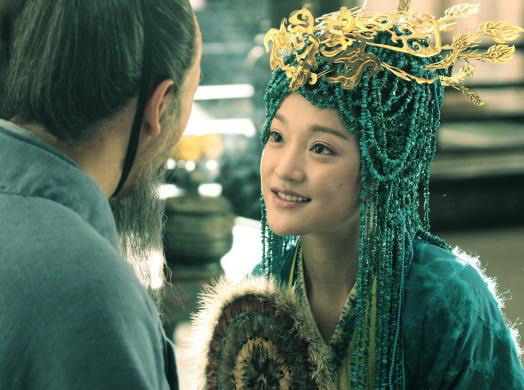 Han Han is a famous post-80s generation professional race-car driver and best-selling author. He is also one of China’s most popular Chinese bloggers, and my own favorite. — Fauna
Han Han is a famous post-80s generation professional race-car driver and best-selling author. He is also one of China’s most popular Chinese bloggers, and my own favorite. — Fauna
From Han Han’s blog:
Watching Confucius
Today I went to see Confucius. Before I went into the theater, I stepped out for a moment to make sure of where my seat was, so as not to disturb others after entering. Once I got in, I regretted it. There weren’t even ten people in the theater and you could practically sit wherever you wanted.
In China’s ancient times, there were many “masters”, and although what they say today contradicts what they said in their own times [i.e., people’s interpretations of their meanings have changed over time], their meaning comes not from whether they spoke well enough but from whether they said enough things. In any time period, politicians have taken what they needed, [and gotten] both praise and blame. Confucius is one of the most meaningful of these people.
To tell the truth, I never felt there was much need to make movies on historical topics. From the perspective of film, it seems as though from their very birth, movies have been doing something that is very opposite from [the idea of] film: killing imagination. But it’s not necessarily true that China’s big historical epics lack in imagination, because the people who write them often create scenes that are diametrically opposed to actual history, so it’s really a collaborative thing [lack of imagination working together with imagination].
The reason most major Chinese blockbusters are historical epics or focus on historical figures is that the filmmakers and investors don’t feel safe. After investing such a lot of money, they feel completely trusting the screenwriters and directors to create a story is unwise, and if a director is somehow able to make their own investment and use creative freedom, the product is often even worse. All of this has become the tragic history of Chinese big-budget films. As for what Chow Yun-fat [the star of Confucius] said about “if you don’t cry after watching Confucius you’re not human”, I believe it’s a misunderstanding. It must have been at an internal meeting to watch the film that the filmmakers themselves cried. What they’re crying about is how many middle school classes and government offices they’re going to have to drag into theaters en masse to break even.

Forgetting about all the political factors and watching the movie just as a film, it is a losing film. What the film is preaching doesn’t leave any influence at all. When Confucius was on the screen talking about “rites” and “benevolence”, some guy to my side was having a ten-minute-long phone conversation. The war scenes in the film are like child’s play. The country of Lu cannot protect itself, but Confucius’s few disciples can drive back the enemy just by building a road block and firing arrows into the sky? Moreover, in the film, the dialogue between characters is not at all persuasive. It’s just like when you were small and your parents told you, “today’s work must be finished today”, but their words ultimately could not convince you. It is no longer an era where a “master” can say a few more lines and attract/trick people. From the movie, I found it very difficult to understand why Confucius’s team of workers continually followed him. In moments when the film was playing up the personalities of the characters, I had to endure ten minutes of the disciples continually yielding a bowl of horsemeat soup [to each other] to demonstrate their cohesiveness. [I had to endure] because I had already endured the story of Confucius’s disciple [of a later generation] Kong Rong giving up pears to his elders throughout my entire childhood.
Ren Quan’s character unexpectedly dies in the end by freezing to death in icy water, which he’s gone into to save a book. This is not moving, it’s stupid. In a situation where the film hasn’t done enough and there’s nothing good about it, the protagonist being extremely satisfied [with the film] is illogical. In a situation where the implicit ideal [which was, in and of itself, unrealistic] has not even been successfully attained, there’s no hope of the movie being realistic. It’s like this: [imagine some] government leaders have been burned, and their secretary rushes in to a sea of fire and saves a copy of the Selected Works of Mao Zedong, but when he comes out he sees he’s only taken the first of two volumes, so he rushes back in, then saves another one and comes out, but as soon as he looks, fuck, it’s not two volumes but three, and even though he knows the house will collapse and he won’t be kay, he rushes in again [for the last volume], and the house collapses and he dies. As an audience member, do you think you could cry at this [movie]?

Zhou Xun [the female lead] is only in the movie because the filmmakers felt a female would help diversify the film. She plays the part of Nan Zi [a historical princess of the Song Kingdom] and spends most of her time flirting with Confucius,but he’s all talk and no ‘action’, which made me nervous. In the end, she didn’t know why she was being shot to death.
I will give Confucius two points. First, because of Chow Yun-fat’s exciting performance in All About Ah Long I will give this movie one point for encouragement. I think if Chow had said “those who don’t cry aren’t people” about Ah long he might have been more correct. Also, because the director is female, I will encourage her with a point. But it must be said, that whether it’s this female director’s Confucius or another female director’s I am Liu Yuejin, their grasp of non-emotional films, especially the more complex/intricate ones, is rather weak. I don’t understand why they don’t make films about love or life [instead], which is what female directors are good at. Zhang Aijia’s Heartbeat or Xu Anhua’s Day and Night in Tianshui are good movies by female directors. Why should women embarrass themselves?
Finally, I want to say that the movie Confucius, whether it is from the perspective of cinematographic meaning, business profits, artistic merit, what it explores, its educational qualities, its historical accuracy, its entertainment value, its emotional resonance, etc., is completely unnecessary. It is a film that could be completely done without.
Translated by C. Custer, editor of ChinaGeeks.
Confucius says: The superior man is firm in the right way, and not merely firm. chinaSMACK personals.



77 Comments
Leave a Reply4 Pings & Trackbacks
Pingback:ChinaGeeks » The Future of ChinaGeeks
Pingback:ChinaGeeks » Sexism in Han Han’s Film Review?
Pingback:::Wondering Mind:: » Blog Archive » Confucius : The movie no one wants?
Pingback:The Power of the Twenty-somethings | This is China! blog